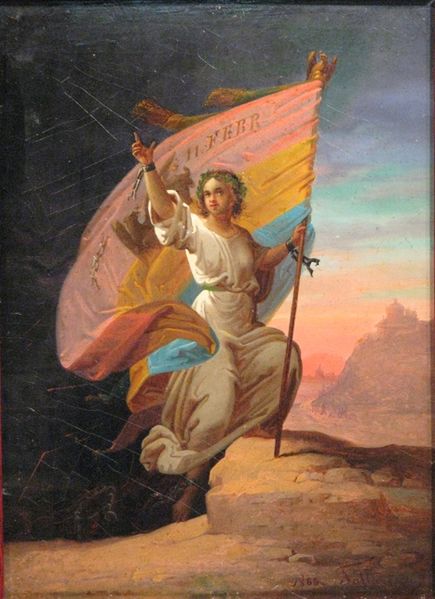Description
The painting "February 11 - 1866 - Modern Romania" by Gheorghe Tattaralescu is a work that encapsulates a crucial moment in Romanian history, marked by the arrival of Prince Carlos de Hohenzolern to the presidency of the country. TattareRescu, recognized as one of the most prominent Romanian painters of the nineteenth century, creates a visual narrative that not only celebrates this event, but also reflects the aspirations of a nation that seeks to define its identity and modernity after years of instability.
The composition of the work is remarkable for its balanced structure. In the foreground, there is a group of figures representing different sectors of Romanian society, placed in a space that suggests a direct connection with the viewer. This approach to the characters suggests a dialogue between the people and the process of modernization that begins at that time. Among these individuals men and women are distinguished in traditional clothing, which symbolizes both Romania's cultural wealth and their desire for progress. TattareRescu, through its brushstroke, captures the serene but determined expressions of the faces, instilling in each figure an individuality that alludes to the social diversity of the country.
The color plays a fundamental role in the work, where a palette of warm and terrible tones predominate, evoking a sense of continuity with the past. Subtle tones give life to the scene, while red and gold in the costumes of some characters suggest a yearning for greatness and dignity, evoking a national identity under construction. The lighting, soft and natural, emphasizes the atmosphere of hope and renewal that characterizes this historical moment, at the same time reflecting the light of a new dawn for Romania.
Tattararescu also enters the symbolism of the architectural elements that appear at the bottom of the painting, where buildings that refer to the architecture of the Renaissance can be distinguished, which not only reinforces the sense of modernity, but also points out a cultural heritage that the country strives to claim. This suggests that the path to modernity is not a radical rupture with the past, but an evolution based on the traditions that shape national identity.
In addition, the work reflects Romania's political and social context in the 19th century, a period of rich cultural and political transformations. TattareRescu, who had studied in Italy and had been influenced by neoclassicism and romanticism, uses a style that combines these elements with a concern for national identity and realism. This fusion results in a work that is both a historical document and an artistic manifestation of hope and aspiration.
In summary, "February 11 - 1866 - Modern Romania" by Gheorghe Tattaralescu not only preserves a moment in time, but also resonates with the echo of a nation that seeks its place in the world. Through its cunning composition, the use of color and the representation of diverse characters, Tattaralescu manages in its modernization process.
KUADROS ©, a famous paint on your wall.
Hand-made oil painting reproductions, with the quality of professional artists and the distinctive seal of KUADROS ©.
Art reproduction service with satisfaction guarantee. If you are not completely satisfied with the replica of your painting, we refund your money 100%.

